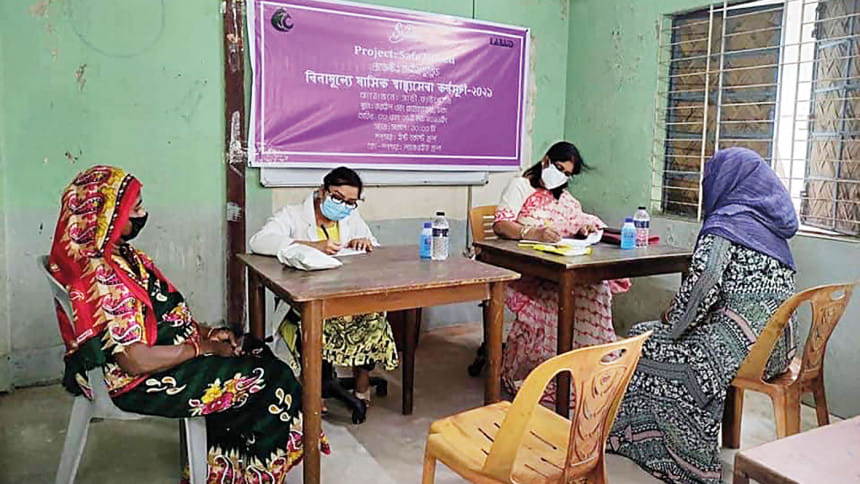Biodegradable Shaathi Pads: Helping Women and the Environment

Have you ever imagined how many disposable pads a menstruating woman or girl uses in a year or how much they actually cost?
According to an estimation of Shaathi, a social enterprise that works on empowering women and girls through locally produced eco-friendly reusable pads, a woman uses around 200 disposable pads a year, which contain plastic and harsh chemicals that are non-biodegradable and serious environmental pollutants.
Besides, a woman experiences almost 400 periods in her lifetime, which means she needs to spend over Tk 80,000 on menstrual supplies, which is simply unaffordable for millions of women in Bangladesh.
This is why, sanitary napkins are still a luxury in Bangladesh, and according to surveys and data from sanitary napkins producers, even today, more than 75 percent women in Bangladesh use unsanitary rags, cottons, tissue papers, newspaper sheets and pieces of jute sacks on their heavy-flow days, compromising their reproductive health and well-being.
According to Barrister Mifrah Zahir, who is also the founder of Shaathi, the negative externalities that come with disposable pads can be reduced if we start using reusable pads, as they contain no such harmful materials and have no negative environmental impacts.
"That is why we chose to produce reusable pads, as these can be washed, dried, and used again for a minimum of 12 months, making them a highly cost-effective solution," she said.
Shaathi, since its inception in August 2020, has been producing the plastic-free biodegradable pads with soft cotton flannel and absorbent cotton, covered with unbleached printed organic cotton, and distributing those to underprivileged women and girls, who can't afford sanitary pads at the commercial price.
Most importantly, these pads are made by underprivileged women, most of whom would perhaps otherwise be working at readymade garment factories.
Today, these women are not only making a living by making these pads, but also using the pads to manage their menstruation and distributing them to other women in their community.
In order to continue an uninterrupted supply of free pads to the women and girls from low-income backgrounds, Shaathi has also been selling pads under its programme titled "Pad for Pad".
Under this programme, anyone can buy a packet of Shaathi pads (six pads along with a storage pouch) at Tk 500, from their official Facebook and Instagram pages, which ensures that another underprivileged girl or woman gets a pad for free.
One such woman is 27-year-old Lima Begum of Rayerbazar area of the capital, whose only recourse on the heavy-flow days was old rags, until she developed itching, irritation and a Urinary Tract Infection (UTI) at the beginning of this year.
Lima, the wife of a bus driver, was unable to buy sanitary napkins to manage her periods, as she always had to prioritise food and other essentials over menstrual hygiene supplies – a situation that worsened during the COVID-19 lockdown.
During a menstrual health management campaign conducted by the Shaathi team at Rayerbazar and Korail slums, Lima along with 200 other underprivileged women and girls of her locality got free health advice and medicine from the Shaathi team.
They were also provided with Shaathi pads that made the lives easier for many women and girls from low-income settlements.
For example, Lima said she replaced her scrap clothes with Shaathi pads, and she no longer has any reproductive health complications.
"These pads are way better than clothes, and I can dry and keep these for the next period, which is why, I don't have to spend a single taka on period products," said Lima.
"If these could be made available for all, women like us would be greatly benefited from these pads," she added.
Shaathi has been planning to make the pads accessible for all, allowing women to prepare the pads on their own from the raw materials provided by Shaathi, and selling those within their communities at a subsidised price.
"If this can be done, women could buy these pads from the women of their community, and they no longer need to feel shy about buying it from the local medicine stores. And this will eventually help to change their behaviour patterns as well," said Barrister Zahir.
To observe Menstrual Hygiene Day this year, today (May 28) Shaathi will also distribute free reusable pads to 30 sex workers in the city.
Along with preparing and distributing reusable pads, the organisation has been working on conducting sessions at schools and safe homes on menstrual health and hygiene education, since it's still considered a taboo in our society, and adolescents lack proper information, as this topic is not included in the curriculum.
The organisation has already conducted a session on MHM with 50 girls in an all girls' orphanage at Mohammadpur, run by Rights and Sights for Children.
Shaathi has also developed a curriculum both in English and Bangla, that contains lessons on topics such as vaginal anatomy, the process of menstruation, management of menstruation in a hygienic way, foods girls should consume and how to combat the myths and superstitions related to periods.
"Currently, we are just waiting for schools to reopen," said Barrister Zahir.

 For all latest news, follow The Daily Star's Google News channel.
For all latest news, follow The Daily Star's Google News channel. 



Comments